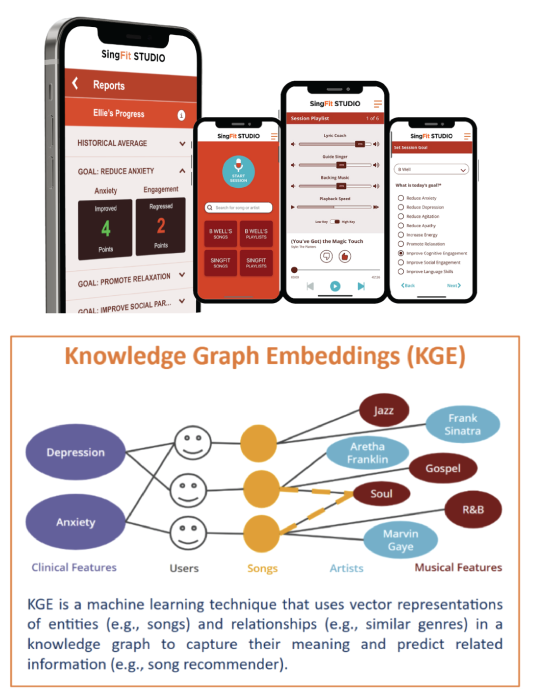Investigators:
Jennifer Rae Myers, Musical Health Technologies
Chelsea S. Brown, Musical Health Technologies
MassAITC Cohort: Year 3 (AD/ADRD)

Project Accomplishments: This pilot project focused on developing an equitable machine learning (ML)-based music intervention for older adults at risk for Alzheimer’s disease. Data collection, which began in 2024, included online surveys and music preference assessments from rural-residing participants, with 76% reporting at least one dementia-related risk factor. Analysis revealed that participants preferred songs with positive sentiment, which were also perceived as more beneficial for mood improvement. These findings informed the development of a hybrid music recommendation model that integrates user preferences and song characteristics to enhance emotional well-being.
The ML recommender system was built using knowledge graph embeddings (KGE), achieving a normalized discounted cumulative gain (NDCG) of 0.009—more than double the random baseline—demonstrating early promise despite limited user feedback. User satisfaction data from Phase II is currently being analyzed, with a goal of reaching 85% satisfaction. These efforts lay the groundwork for future refinement, user testing, and potential commercialization of a personalized music intervention aimed at supporting cognitive and emotional health in older adults.
Initial Proposal Abstract: Older adults in rural communities face unique health challenges that place them at a greater risk for Alzheimer’s disease (AD). Social determinants of health such as healthcare access and social engagement coupled with psychosocial barriers (e.g., stigma, medical mistrust) often exacerbate their risk. Although the adoption of digital health interventions has shown promise in reducing cognitive-related health disparities in rural communities, there remains a lack of consideration regarding rural culture in the design and implementation of such interventions. By creating a more comprehensive, individualized platform through collaborative filtering models, SingFit can serve as a more inclusive and culturally relevant tool for at-risk older adults in rural communities who have been traditionally underrepresented in the development of music-based digital health interventions.
The specific aims are to 1) Develop culturally inclusive user personas: The unique needs, preferences, and backgrounds of at-risk rural-residing older adults will be identified to learn more about their goals, challenges, and perspectives regarding music-based digital health interventions. 2) Design an Intelligent Recommendation System: ML models will be developed using collaborative-based filtering that utilizes user data to identify optimal therapeutic music components for enhancing engagement and emotional resonance among rural-residing older adults at-risk for AD. Finally 3) Assess acceptability of personalized therapeutic music sessions: An online survey will be conducted to evaluate user feedback of the song/guided prompts generated by the recommendation system among a diverse group of rural-residing older adults at-risk for AD.
Surveys will collect perceived benefit, sentiment, relevance, and preference for SingFit algorithms and subsequent collaborative filtering algorithms. Additional data regarding demographic characteristics and musical preferences will also be collected. The data will be used to develop culturally inclusive user personas (e.g., segment analysis) and preprocessed in order to design and evaluate an Intelligent Recommendation System.
Outcomes:
- Publication: Developing an Equitable Machine Learning-Based Music Intervention for Older Adults At Risk for Alzheimer Disease: Protocol for Algorithm Development and Validation
 Authors: Chelsea S Brown, Luna Dziewietin, Virginia Partridge, Jennifer Rae Myers Abstract Background: Given the high prevalence and cost of Alzheimer disease (AD), it is crucial to develop equitable interventions to address lifestyle factors associated with AD incidence (eg, depression). While lifestyle interventions show promise for reducing cognitive decline, culturally sensitive… Read more: Publication: Developing an Equitable Machine Learning-Based Music Intervention for Older Adults At Risk for Alzheimer Disease: Protocol for Algorithm Development and Validation
Authors: Chelsea S Brown, Luna Dziewietin, Virginia Partridge, Jennifer Rae Myers Abstract Background: Given the high prevalence and cost of Alzheimer disease (AD), it is crucial to develop equitable interventions to address lifestyle factors associated with AD incidence (eg, depression). While lifestyle interventions show promise for reducing cognitive decline, culturally sensitive… Read more: Publication: Developing an Equitable Machine Learning-Based Music Intervention for Older Adults At Risk for Alzheimer Disease: Protocol for Algorithm Development and Validation - Poster Presentation: a2 National Symposium 2025
 Title: An Equitable ML-based Music Intervention for At-risk Older Adults Authors: Jennifer R Myers, Chelsea S Brown, Luna Dziewietin, Ozel Yilmazel, Virginia Partridge
Title: An Equitable ML-based Music Intervention for At-risk Older Adults Authors: Jennifer R Myers, Chelsea S Brown, Luna Dziewietin, Ozel Yilmazel, Virginia Partridge - Oral Presentation: Alzheimer’s Association International Conference 2024
 Dr. Jennifer Myers presented “An Equitable ML-based Music Intervention for At-risk Older Adults,” at the Alzheimer’s Association International Conference (Preconference) in Philadelphia, PA. The presentation was part of the Introduction To The Artificial Intelligence And Technology Collaboratories (AITC) For Aging Research Program Pilot Project Showcase
Dr. Jennifer Myers presented “An Equitable ML-based Music Intervention for At-risk Older Adults,” at the Alzheimer’s Association International Conference (Preconference) in Philadelphia, PA. The presentation was part of the Introduction To The Artificial Intelligence And Technology Collaboratories (AITC) For Aging Research Program Pilot Project Showcase - Oral Presentation: Society for Digital Mental Health Conference
 Chelsea Brown, Co-PI presented a flash talk titled “Acceptability of an Equitable ML-based Music Intervention for Older Adults at-risk for AD” at the virtual Society for Digital Mental Health Conference 2024.
Chelsea Brown, Co-PI presented a flash talk titled “Acceptability of an Equitable ML-based Music Intervention for Older Adults at-risk for AD” at the virtual Society for Digital Mental Health Conference 2024.
